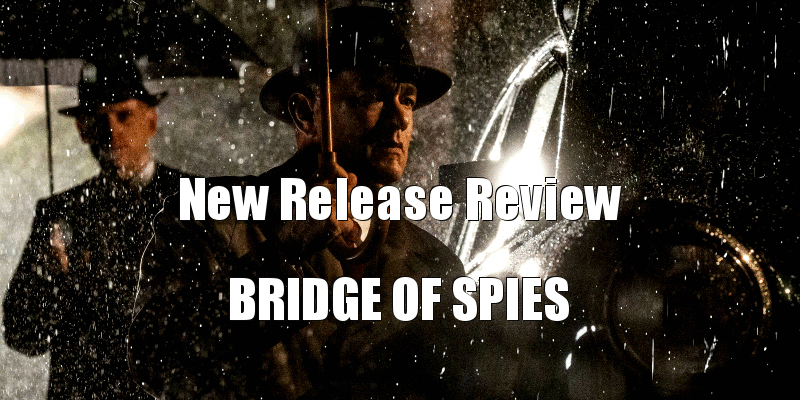
Review by Eric Hillis (@hilliseric)
Directed by: Steven Spielberg
Starring: Tom Hanks, Mark Rylance, Alan Alda, Amy Ryan, Eve Hewson, Jesse Plemons
"Stories like this and Lincoln are an uncomfortable fit for Spielberg, a touchy-feely director making thinky-talky movies. That said, there's enough in Bridge of Spies to keep most viewers interested, but ultimately it's a waste of an entertainer. And in these troubled times, we could really use some of that old Spielberg magic."

Steven Spielberg is undoubtedly the most famous Hollywood director to emerge from the world of TV. After helming episodes of network staples like Columbo and Marcus Welby MD, a youthful Spielberg gave us arguably the most cinematic made for TV movie ever produced in 1971's man vs killer truck epic Duel. It was clear his was a talent that required the broad canvas of the big screen, and his resulting CV stands as testament to such early promise. For those of us who have marvelled at Spielberg's cinematic spectacles, it's disheartening to see him now take on projects that could just as easily debut on cable TV. Lincoln was his least cinematic venture to date, as Spielberg took a backseat to his leading man, Daniel Day Lewis. Bridge of Spies sees Spielberg waste his talents again in a movie that largely consists of a series of conversations in bars, offices and drawing rooms.

The movie teases us by opening with a bravura, dialogue free sequence that introduces us to Rudolf Abel (Mark Rylance), a melancholy Russian spy based in 1957 Brooklyn. We watch as Abel leaves his dingy flat for the subway, where he is followed by a pair of FBI men - who bear more than a passing resemblance to James Mason's North by North West henchmen - who eventually arrest him on spying charges. This is the last such set-piece Spielberg offers us as we then meet Tom Hanks' crack insurance lawyer James Donovan, whose firm (headed by Alan Alda, an actor that always makes you feel a little more reassured about life in knowing he's still around) breaks the news that he's been chosen to represent Abel. Donovan knows such a role will make him a figure of hate among the red-scared American public, but figures to deny Abel a fair trial would be the most un-American act imaginable.
One of Spielberg's trademarks is having a character quickly turn around in their opinion of a situation, be it Duel's Dennis Weaver bouncing up and down on the hood of his car in an attempt to free it from under a bus mere minutes after berating kids for doing just the same, or Lorraine Gary shouting at her Jaws kids to get out of the water after flicking through a book on shark attacks makes her come around to her husband's line of caution. With Donovan, Spielberg gives us another turnaround, but it's more gradual. When we first meet Donovan, he's berating a prosecutor for referring to his client as "my guy". Later on, after he warms to Abel's resiliance, he is happy to call him his "guy". The Coen brothers came in to give Matt Charman's script a polish, but it's clear Spielberg has added some touches of his own. One such touch makes for one of those moments where Spielberg's visual storytelling verges on vulgarity, involving an echo of Donovan's witnessing East Germans mowed down while attempting to jump the freshly erected Berlin wall. It's reminiscent of the famous girl in the red dress from Schindler's List, a Spielbergian moment that to this day I'm still torn on deciding whether it's a piece of genius or gaudiness.

At two hours 20 minutes, Bridge of Spies rambles at times, and it's all too easy to see where cuts could have been made. Far too much time is devoted to Francis Gary Powers, the spy-plane pilot who ejected over Russia, his capture leading the US to negotiate a deal to trade Abel for the pilot. Then there's the character of Donovan's young assistant Doug (Billy Magnussen), who is given a big introduction early on, but both he and his sub-plot of secretly dating Donovan's daughter (Eve Hewson) instantly disappear, making us assume he played a bigger role in an earlier draft. Why not remove the character completely if his presence is meaningless?
The movie's best scenes are those between Donovan and Abel, with Mark Rylance delivering a wonderfully low key performance as the latter. Halfway through, Donovan leaves the US for East Germany to negotiate the trade of Abel for both Powers and a young American economics student caught on the wrong side of the wall. At this point the movie becomes a lot less interesting, as the drama of Donovan's difficult situation back home is extinguished.

Hanks is often labelled the Jimmy Stewart of his generation, but for me that's a stretch. There's nothing in cinema as heart-breaking as seeing Jimmy Stewart cry, but when the tears flow from Hanks here it just feels a little too forced, Spielberg trying too hard to mine an emotional reaction from what is largely an intellectual film. Stories like this and Lincoln are an uncomfortable fit for Spielberg, a touchy-feely director making thinky-talky movies. That said, there's enough in Bridge of Spies to keep most viewers interested, but ultimately it's a waste of an entertainer. And in these troubled times, we could really use some of that old Spielberg magic.



